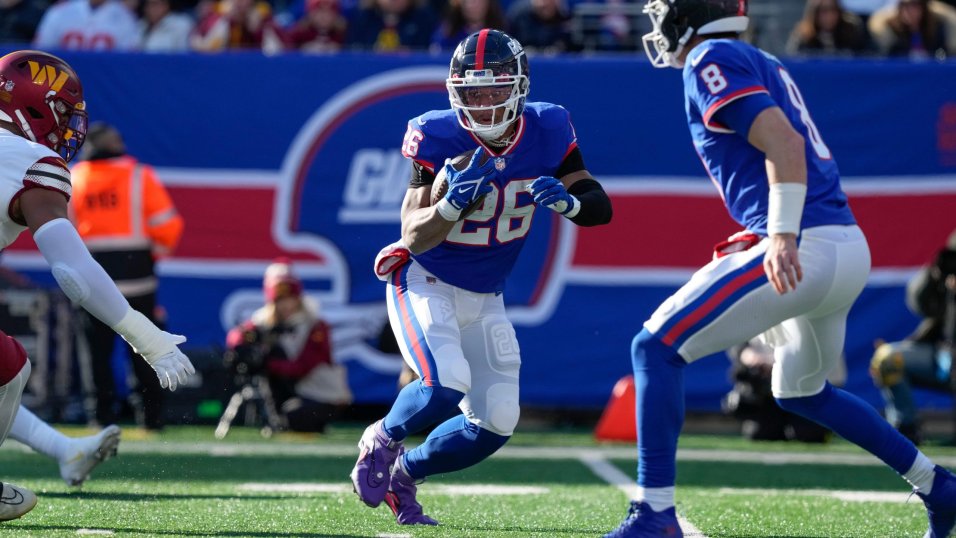The deadline for the four remaining franchise-tagged players to sign a multi-year deal came and went at 4 p.m. on Monday, and none of the three running backs were able to come to terms on a multi-year extension with their respective clubs. About 24 hours prior, Jacksonville Jaguars tight end Evan Engram agreed to a three-year, $41.25 million extension that keeps him with the club through 2025.
What do the outcomes today mean for the individual players, their respective teams and the league at large?
TE Evan Engram, Jacksonville Jaguars
The New York Giants, interestingly enough, held on to their former first-round pick in Engram through several trade deadlines with reported interest, and he finally displayed the type of weapon he could be in an offense with a legitimate passing attack in 2022.
There has been plenty of discourse surrounding the barren running back market, understandably so, but the tight end position isn’t faring much better. Engram received less in fully guaranteed money than two hypothetical franchise tags — with $24 million fully guaranteed versus $24.97 million for two tags — but will receive $25.5 million in two-year cash flow. Engram's cash flow narrowly exceeds David Njoku with the Cleveland Browns at $25 million, and that deal appears to have been used as a benchmark contract and floor for Engram and company.
Engram thus receives an average of $12.75 million over the first two years of the deal and then has a third year worth $15.75 million. However, the structure with a $12.5 million signing bonus and $7.5 million option bonus for 2024 could work in Engram’s favor in that final year. For starters, upfront money is always a good thing. But secondly, the $7.9 million in dead cap in 2025 perhaps gives Jacksonville pause on releasing Engram, given the sunk cost.
Engram made out better than franchise-tagged tight ends from last offseason in Mike Gesicki and Dalton Schultz, who played out their deals in 2022 and signed one-year flier contracts for less money than the tag the year prior. Engram will turn 29 years old a week before the Jaguars kick off their season, and the shelf life at the position is often too short to turn down a deal like this, which Jacksonville clearly leveraged in negotiations.
Engram's 73 receptions were tied for the third most among tight ends, his 766 receiving yards ranked fourth and his 481 yards after the catch placed second. Even with an uptick in targets, Engram recorded a career-low 3.9% dropped pass percentage, good for a top-15 mark among tight ends with at least 25 targets on the season. This was the time to strike for Engram, and now he gets to finish up the prime of his career with a young and uber-talented Trevor Lawrence under center.
RB Saquon Barkley, New York Giants
The only other negotiation that seemed even remotely close to materializing was the former No. 2 overall pick in Barkley. Recent reports came out that Barkley had added to his representation team, working with Ed Perry of CAA in addition to Kim Miale of Roc Nation. That can sometimes be a signal of a player’s willingness to get a deal done. Giants quarterback Daniel Jones outright switched his representation to Athletes First shortly before coming to terms on a four-year deal with New York in March.
From the moment the Giants were able to reserve the franchise tag for Barkley by getting a deal done with Jones, the situation seemed bleak. A franchise tag of $10.091 million is hardly even a raise over Barkley’s rookie contract, which carried an average annual value of $7.8 million. And during his negotiation period we saw Aaron Jones take a pay cut in Green Bay, Dalvin Cook get outright cut by Minnesota and Joe Mixon also take a pay cut in Cincinnati. Barkley accounted for nearly 30% of New York's total yards on offense in 2022 and was top five in touches across the NFL. Barkley is a true three-down back, with the ability to run routes and haul in acrobatic catches. He also earned a 71.3 pass-blocking grade in 2022, which ranked fourth at the position.
The running back market may truly be reaching a rock-bottom point, as there hasn’t been a multi-year deal worth $10 million or more annually since Nick Chubb signed for $36.6 million across three years back in 2021.
Two franchise tags for Barkley would come out to roughly $22.2 million, and it’s not clear if New York even offered that much money in fully guaranteed dollars or two-year cash flow, which would make it understandable why no contract was signed. Barkley will turn 27 years old shortly after the 2023 campaign and could still cash in, but the aforementioned Dalvin Cook got cut at 27 years old coming off a season with 1,184 rushing yards at a 4.5 yards-per-carry clip.
RB Josh Jacobs, Las Vegas Raiders & RB Tony Pollard, Dallas Cowboys
There never appeared to be much momentum in either situation, with Pollard’s recovery from a broken leg sustained in the NFC playoffs presumably delaying any meaningful conversations for too long to work toward a deal. With Jacobs, the Raiders declined his fifth-year option last offseason and their penalty as a result was a measly $2 million in additional compensation on the tag. The Raiders front office largely comes from New England, where the team has never paid a running back $5 million annually on a multi-year deal. Further, the team is in a weird state of flux and likely doesn’t view spending big at the running back position as a path back to contention.
No matter the perspective, the fact a former first-round pick coming off a rushing title who will be just 25 years old through the entire 2023 season couldn’t even receive a legitimate offer is jarring. People will be quick to wonder if either Jacobs or Barkley — who have yet to sign their franchise tenders unlike Pollard — will sit out regular season games. The issue there is it’s hard to see that maneuver actually gaining them any leverage. Both are clearly the best backs on their football teams, and both broke off 50-plus-yard gains in 2022 that effectively won them games, but teams don’t seem too concerned with finding replacements in the interim.
Le’Veon Bell was mocked for sitting out his second franchise tag season, and he did eventually sign a solid contract with the New York Jets the following offseason for just more than $13 million per year, but he averaged 3.2 yards per carry in an anemic offense before being let go just weeks into the second year of the deal. Bell deserves thanks from the young backs behind him for showing the threat of a holdout has teeth; the issue is that the Steelers kept plugging along without him and that the team that did give him the big deal got effectively nothing out of it.
The next running back up for a new deal will represent a true inflection point for the market. Indianapolis Colts star Jonathan Taylor is entering the final year of his contract in 2023 and is eligible for an extension this offseason. If Taylor can’t eclipse $40 million in new money cash flow over the first three years of his deal with total guarantees in the $30 million range — two fairly modest targets — then we’re basically waiting for Bijan Robinson three years from now to see if he can break through.
The interesting dichotomy in the market is that two teams still used top-12 overall draft selections to take running backs at the same time that not one player can get a good veteran deal, with the market in the midst of a downward spiral. There may eventually be a bubble to burst where a team can find value in adding a running back on a modest second contract instead of investing high-end draft capital at the position, but that will depend on how contracts for players such as Miles Sanders and David Montgomery, among others, ultimately pan out.

